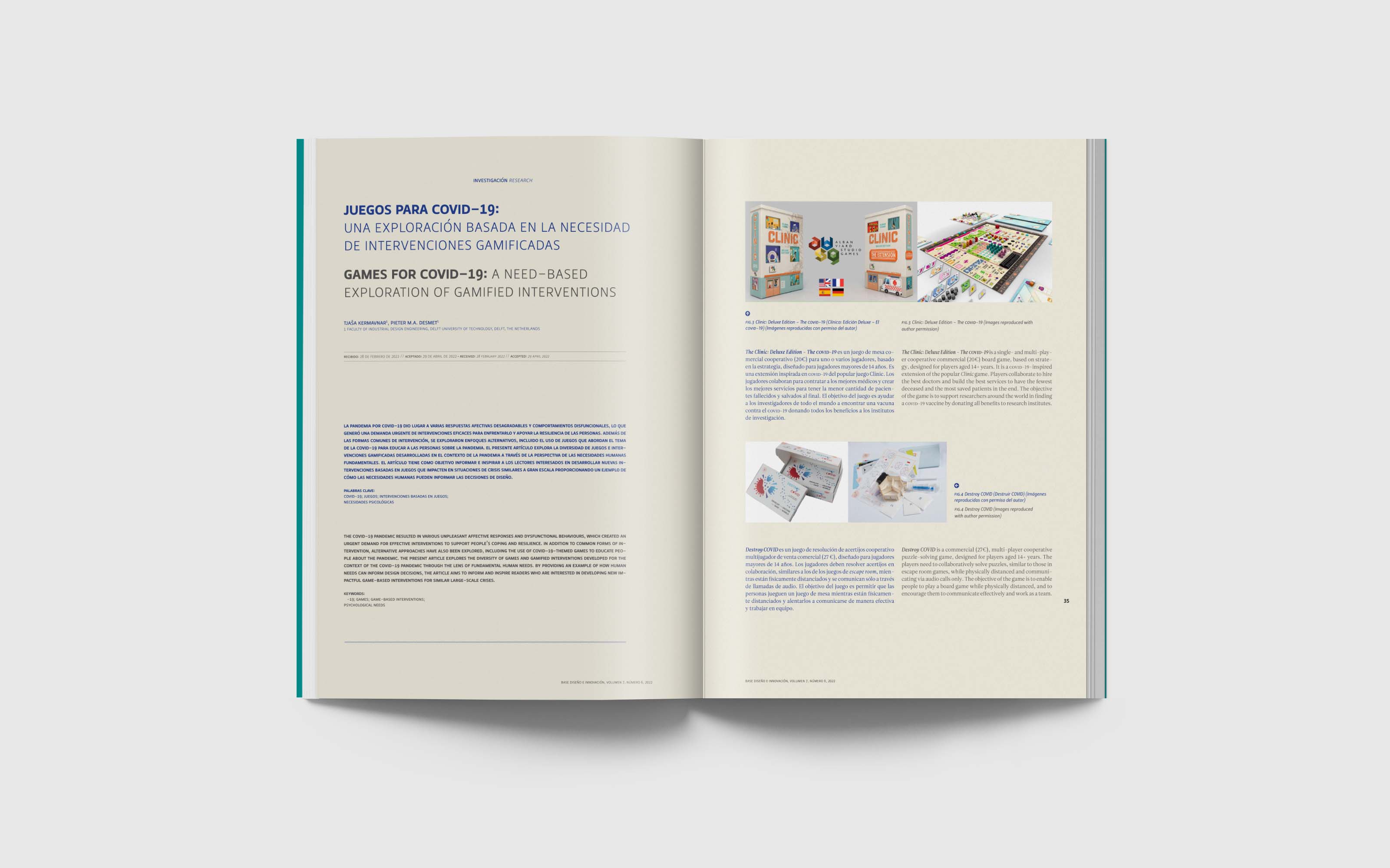Games for COVID-19 A need-based exploration of gamified interventions
Main Article Content
Abstract
The COVID-19 pandemic resulted in various unpleasant affective responses and dysfunctional behaviours, which created an urgent demand for effective interventions to support people’s coping and resilience. In addition to common forms of intervention, alternative approaches have also been explored, including the use of COVID-19-themed games to educate people about the pandemic. The present article explores the diversity of games and gamified interventions developed for the context of the COVID-19 pandemic through the lens of fundamental human needs. By providing an example of how human needs can inform design decisions, the article aims to inform and inspire readers who are interested in developing new impactful game-based interventions for similar large-scale crises.
Article Details
References
Barr, M., & Copeland-Stewart, A. (2021). Playing video games during the COVID-19 pandemic and effects on players’ well-being. Games Culture, 15554120211017036. https://doi.org/10.1177/15554120211017036
Brooks, S. K., Webster, R. K., Smith, L. E., Woodland, L., Wessely, S., Greenberg, N., & Rubin, G. J. (2020). The psychological impact of quarantine and how to reduce it: Rapid review of the evidence. The Lancet, 395(10227), 912-920. https://doi.org/10.1016/s0140-6736(20)30460-8
Business Insider (2020). The WHO is recommending video games as an effective way to stop the spread of COVID-19, one year after adding ‘gaming disorder’ to its list of addictive behaviors. Retrieved 23 December 2021, from https://www.businessinsider.nl/who-video-games-coronavirus-pandemic-mental-health-disorder-2020-4?international=true&r=US
De Lope, R. P., & Medina-Medina, N. (2017). A comprehensive taxonomy for serious games. Journal of Educational Computing Research, 55(5), 629-672. https://doi.org/10.1177/0735633116681301
Deci, E. L., & Ryan, R. M. (2000). The" what" and" why" of goal pursuits: Human needs and the self-determination of behavior. Psychological Inquiry, 11(4), 227-268. https://doi.org/10.1207/s15327965pli1104_01
Desmet, P. M. A. (2012). Faces of product pleasure: 25 positive emotions in human-product interactions. International journal of design, 6(2), 1-29.
Desmet, P. M. A., & Fokkinga, S. F. (2020). Beyond Maslow’s pyramid: Introducing a typology of thirteen fundamental needs for Human-Centered Design. Multimodal Technologies and Interaction, 4(3), 38. https://doi.org/10.3390/mti4030038
Deterding, S., Khaled, R., Nacke, L. E., & Dixon, D. (2011). Gamification: Toward a definition CHI 2011 Gamification Workshop Proceedings, Vancouver, Canada.
Flinders, M. (2020). Coronavirus and the politics of crisis fatigue. The Conversation. Retrieved 31 May from https://theconversation.com/coronavirus-and-the-politics-of-crisis-fatigue-134702
Fokkinga, S. F., & Desmet, P. M. A. (2013). Ten ways to design for disgust, sadness, and other enjoyments: A design approach to enrich product experiences with negative emotions. International Journal of Design, 7(1), 19-36.
Himeno, M., & Tano, S. (2019). Analysis of motivation model using real user data from social games for smartphones extended to social factors based on Maslow’s hierarchy of needs. In X. Fang, HCI in Games Cham. https://doi.org/10.1007/978-3-030-22602-2_10
Howley, D. (2020). The world is turning to video games amid coronavirus outbreak. Retrieved 23 December 2021, from https://finance.yahoo.com/news/coronavirus-world-turning-to-video-games-150704969.html?guccounter=1&guce_referrer=aHR0cHM6Ly9lbi5tLndpa2lwZWRpYS5vcmcv&guce_referrer_sig=AQAAAKXHUfQ3HFeK9PeV4LcIWWvEeAu0CkT9qygqOvb0SSBl1wvamT3OWV3_4SxvDucVgsomxVEDfPFPfSzPUTN4pruawSnzGE4YXW8NpkEHpxnJgXnmV2uoXsUxK2K2BAlSd9qw7_2jCW82mOrdTq5edbC7NxhD-uPPdaAmm4ahcWbb
Kleinman, E., Chojnacki, S., & El-Nasr, M. S. (2021). The gang’s all here: How people used games to cope with COVID19 quarantine. In Proceedings of the 2021 CHI Conference on Human Factors in Computing Systems (pp. Article 327). Association for Computing Machinery. https://doi.org/10.1145/3411764.3445072
Marne, B., Wisdom, J., Huynh-Kim-Bang, B., & Labat, J.-M. (2012, September 18-21, 2012). The six facets of serious game design: A methodology enhanced by our design pattern library. In A. Ravenscroft, S. Lindstaedt, C. D. Kloos, & D. Hernández-Leo, 21st Century Learning for 21st Century Skills, Saarbrücken, Germany. https://doi.org/10.1177/1039856220947945
Maslow, A. H. (1943). A theory of human motivation. Psychological Review, 50(4), 370.
Nicholson, S. (2015). A RECIPE for Meaningful Gamification. In T. Reiners & L. C. Wood (Eds.), Gamification in Education and Business (pp. 1-20). Springer International Publishing. https://doi.org/10.1007/978-3-319-10208-5_1
Pedrosa, A. L., Bitencourt, L., Fróes, A. C. F., Cazumbá, M. L. B., Campos, R. G. B., de Brito, S. B. C. S., & e Silva, A. C. S. (2020). Emotional, behavioral, and psychological impact of the COVID-19 pandemic. Frontiers in Psychology, 11. https://doi.org/10.3389/fpsyg.2020.566212
Raihan, M. M. H. (2020). Mental health consequences of COVID-19 pandemic on adult population: A systematic review. Mental Health Review Journal, 26(1), 42-54. https://doi.org/10.1108/mhrj-07-2020-0044
Rijnmond. (2013). "Ga brandbommen te lijf met emmer zand en natte dweil". Retrieved May 20 from https://www.rijnmond.nl/nieuws/108498/ga-brandbommen-te-lijf-met-emmer-zand-en-natte-dweil
Ryan, R. M., Rigby, C. S., & Przybylski, A. J. M. (2006). The motivational pull of video games: A self-determination theory approach. Motivation and Emotion, 30(4), 344-360. https://doi.org/10.1007/s11031-006-9051-8
Santini, Z. I., & Koyanagi, A. (2021). Loneliness and its association with depressed mood, anxiety symptoms, and sleep problems in Europe during the COVID-19 pandemic. Acta Neuropsychiatrica, 1-10. https://doi.org/10.1017/neu.2020.48
Sheldon, K. M., Elliot, A. J., Kim, Y., & Kasser, T. (2001). What is satisfying about satisfying events? Testing 10 candidate psychological needs. Journal of Personality and Social Psychology, 80(2), 325. https://doi.org/10.1037/0022-3514.80.2.325
Tay, L., & Diener, E. (2011). Needs and subjective well-being around the world. Journal of Personality and Social Psychology, 101(2), 354-365. https://doi.org/10.1037/a0023779
Terry, P. C., Parsons-Smith, R. L., & Terry, V. R. (2020). Mood responses associated with COVID–19 restrictions. Frontiers in Psychology, 11, 3090. https://doi.org/10.3389/fpsyg.2020.589598
Thangaswamy, G. C., Arulappan, J., Anumanthan, S., & Jayapal, S. K. (2021). Trends and determinants of mental health during COVID-19 pandemic: Implications and strategies to overcome the mental health issues – A rapid review from 2019-2020. International Journal of Nutrition, Pharmacology, Neurological Diseases, 11(1), 1. https://doi.org/10.4103/ijnpnd.ijnpnd_86_20
Xue, H., Desmet, P. M. A., & Fokkinga, S. F. (2020). Mood granularity for design: Introducing a holistic typology of 20 mood states. International journal of design, 14(1).


